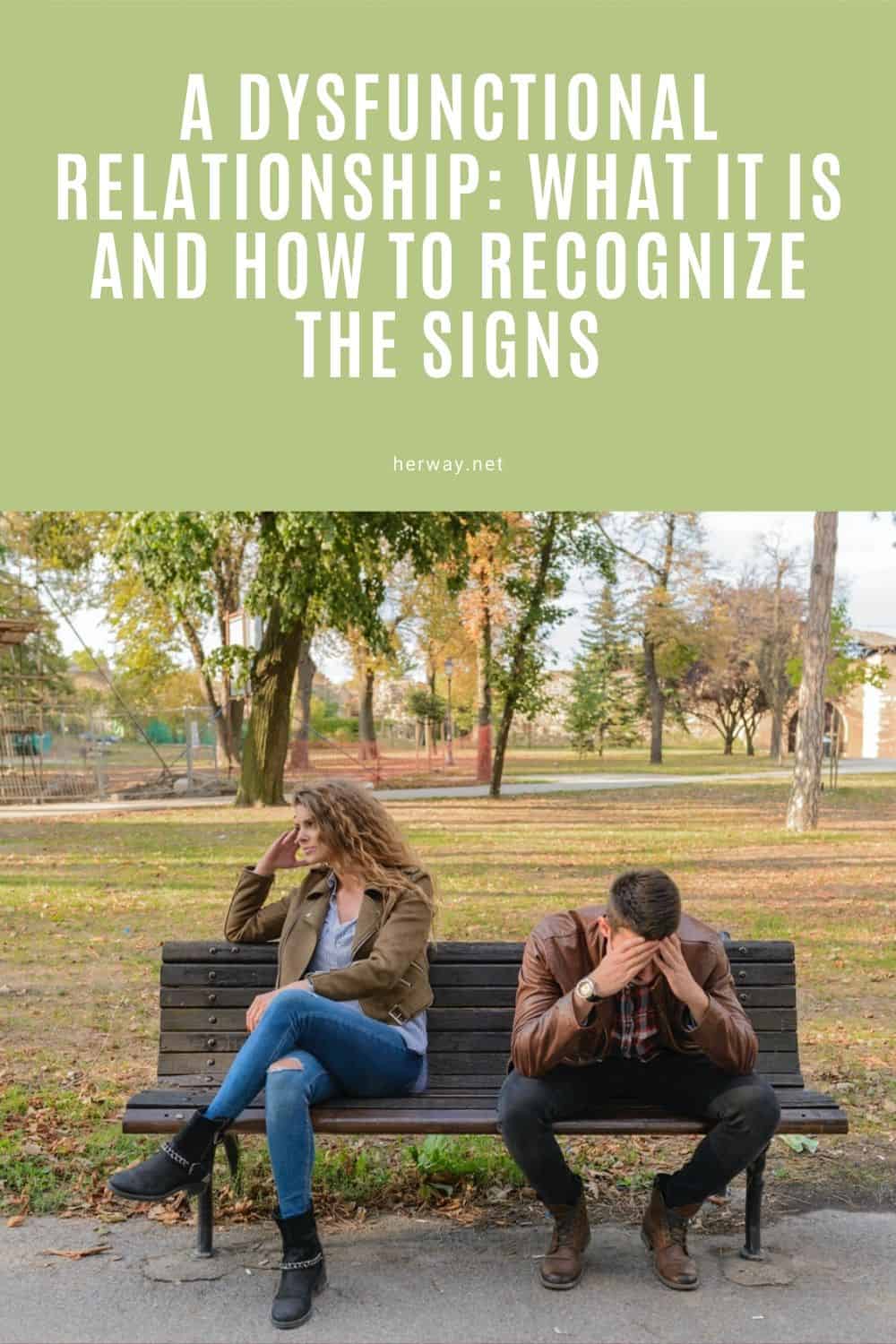Una relazione disfunzionale: Cos'è e come riconoscerne i segni
Let’s start off by saying that perfect relationships don’t exist.
La maggior parte di noi può essere un po' disfunzionale di tanto in tanto, ma ciò che rende questo diverso da un relazione disfunzionale è la consapevolezza del problema e la volontà di risolverlo.
Che cosa sono le relazioni disfunzionali?
Relazioni disfunzionali are relationships that don’t serve their function: They don’t emotionally support their participants and they don’t encourage healthy communication or behavior.
Questo termine può riferirsi a qualsiasi tipo di relazione, sia essa una relazione romantica o una relazione familiare. Qualsiasi legame tra due persone può diventare o iniziare in modo disfunzionale.
Altri termini utilizzati per descrivere modelli comportamentali simili sono relazioni tossiche e codipendente relazioni.
A Codipendente relazione o codipendenza è quando un codipendente è intrappolato in una relazione con un partner che spesso (ma non sempre) è alcolizzato, tossicodipendente o abusatore.
A codipendente rende la relazione più importante di se stesso. Il termine viene usato per descrivere una relazione in cui una persona non è in grado di andarsene nonostante gli abusi emotivi o fisici subiti.

A relazione tossica è un termine usato per descrivere un caso più grave di abuso mentale, emotivo e fisico.
All of these terms describe relationships that are based on unhealthy behavior and they’re often used to describe the experiences of people who grew up in famiglie disfunzionali (ad esempio, figli adulti di alcolisti, tossicodipendenti, abusatori, narcisistie altre persone che sono cresciute in sistemi familiari disfunzionali).
Unfortunately, it’s not unusual for those people to end up in relationships with persone tossiche e ripetere lo schema che hanno appreso nelle prime fasi della vita.
One of the most important things that’s missing from relazioni disfunzionali è la responsabilità.
It’s important to understand that every relationship can become dysfunctional at some point. It often happens when there are unaddressed issues that result in passive-aggressive and other damaging behaviors.
Knowing all this, it’s good to watch out for the segnali di modelli disfunzionali nelle nostre relazioni e cercare di affrontarli in modo adeguato. Ecco i segnali più frequenti.
1. Frequenti conflitti irrisolti

"È meglio spezzare il proprio cuore una volta che avere qualcuno che lo spezza ogni giorno.” – Sconosciuto
I conflitti nascono da una mancanza di comprensione. L'incapacità di comprendere l'altro.
They are unavoidable in any relationship. It’s normal to have conflicts, especially when it comes to some kind of crisis, new life stages, and family matters.
Anzi, spesso possono portare a una migliore comprensione e migliorare la qualità della relazione.
Senza conflitto, le relazioni ristagnano. Solo quando ci confrontiamo con qualcosa, abbiamo l'opportunità di cambiarlo in meglio.
However, it’s not always easy to see the benefits of conflicts, especially when the people involved don’t see conflict as an opportunity for growth but as a way to impose power on another person.
In questo caso, il conflitto non è altro che una forma di comunicazione distruttiva che provoca squilibrio e disconnessione.
Bearing in mind everything that has been said, it’s still true that an excessive number of fights that don’t end in mutual understanding are a harmful behavioral pattern.
When the people involved in a relationship don’t see problems as something that should be solved with joined forces but instead accuse each other of being the cattivo for causing the problem, there’s no way out.
Il gioco delle colpe è un circolo vizioso.
Treating the problem as something that doesn’t apply to them is down to a lack of comprehension and similar experiences.
Lavorare insieme per risolvere il problema è l'unico modo per trasformare i conflitti in qualcosa di positivo.
2. Squilibrio di potere

Come ho detto in precedenza, per ottenere una comunicazione sana, le persone devono lavorare insieme. Ciò che impedisce che ciò avvenga è un squilibrio di potere.
Che cos'è un squilibrio di potere?
Have you ever felt like you are lower down in the hierarchy in a relationship that’s supposed to be based on equality and respect?
Like you’re sotto someone else and have no right to speak about or do certain things? That’s it.
Instead of using one’s beneficial dominant traits in either a mentally, emotionally, or physically useful and stimulating way, there’s a tendency to take advantage of others because of the given opportunity.
Relationships require sharing and cooperation and that takes two. Imbalance happens when one person doesn’t want to cooperate or share.
Questo tipo di comportamento si manifesta di solito con uno dei due partner che si comporta da decisore, che in pratica dice Quello che voglio io è più importante di quello che vuoi tu.
Chiaramente, questo equivale a abuso emotivo e fa sentire l'altro partner più piccolo e soppresso.
L'obiettivo di una relazione è quello di sostenersi a vicenda, condividere le responsabilità ed essere presenti l'uno per l'altro.
In a normal relationship, you shouldn’t be scared to speak up or feel inadequate to say or do something you like.
3. Disconnessione emotiva

Responding to partners’ needs, engaging in their interests, and supporting them in what they love to do is one of the crucial things that build trust and safety.
La fiducia emotiva crea intimità e l'intimità è ciò che tiene unita una coppia.
Intimacy is a safe place and knowing you have somebody to count on, somebody who accepts you as you are, appreciates you, and loves you. It’s not only about the physical aspects.
Ogni relazione forte richiede una connessione fisica, mentale ed emotiva. Se uno di questi elementi manca, si verifica uno squilibrio.
La mancanza di connessione emotiva provoca problemi di relazione. Couples feel distant from one another and there’s a fear of sharing emotions for various reasons.
In order to restore intimacy, it’s crucial to allow vulnerability.
4. Colpa e senso di colpa

La colpa è sicuramente uno dei modi più comuni per distruggere una relazione.
Come?
L'incolpazione costante è una forma di abuso emotivo. L'incolpazione ingiustificata lascia cicatrici emotive e manda in frantumi il autostima of the person who’s being blamed.
It’s common for a blamed person to start believing the accusations about the things that he or she has never done.
Con la colpa arriva il senso di colpa, e con il senso di colpa la persona che viene incolpata continua ad abbassare i propri standard e finisce in un circolo vizioso di colpa e senso di colpa, tollerando un comportamento abusivo.
La colpa è spesso una delle prime bandiere rosse. Può iniziare come aggressività passiva e trasformarsi lentamente in accuse aperte.
5. Minacce di abbandono

Un altro aspetto molto importante interazione disfunzionale è la minaccia di un rottura e abbandono. Questo rientra nella categoria della manipolazione emotiva, che utilizza la paura come combustibile.
It doesn’t matter what kind of previous experiences a person has had or how mature the person is, the threat of abandonment will leave emotional scars and trigger deep-rooted fears in all humans– solitudine, isolamento e rifiuto.
Partner disfunzionali will use this fear to control their victims’ actions.
Verbal abuse is very real, in the same way as physical abuse. Unfortunately, it’s not always recognized as such.
6. Non rispettare i limiti e il libero arbitrio

"Nessun partner in una relazione d'amore dovrebbe sentirsi in dovere di rinunciare una parte essenziale di sé per renderla praticabile.” – Maggio Sarton
To understand what violating boundaries means it’s easier when we look at what healthy boundaries look like.
While it’s true that relationships are based on intimacy and sharing personal things with the other person that doesn’t mean that we’re not allowed to have privacy.
Tutti relazioni sane hanno confini – and they are set intentionally by a couple who have previously talked about what does and doesn’t make them comfortable.
Non si deve mai essere di sacrificare i propri amici, i propri sogni o la propria dignità.
For example, if you don’t like public displays of affection, sharing passwords for your personal accounts, spending time with certain people, or going to certain places, your feelings and needs should be respected.
As long as you’re not taking away the freedom of others and care for their benessere you’re allowed to have your own preferences.
7. Senza speranza

You don’t have to fix anyone.
If you constantly feel down, oppressed, and sad in a relationship that’s il segnale di pericolo. If you feel like you can’t live your la propria vita how you want to, the chances you’re in a relazione disfunzionale sono elevati.
L'essere felici è strettamente associato alla qualità delle relazioni che abbiamo nella vita, soprattutto quelle più strette.
Maybe you know you love your partner but things between you just aren’t working out. Sometimes people are just not compatible and other times some bigger issues – come malattia mentale – aren’t addressed.
Questo può valere per entrambi i partner. Quando si tratta di un salute mentale Ci sono molti scenari possibili che devono essere presi in seria considerazione e discussi con uno specialista. psicoterapeuta.
Maybe you’re unaware of the sacrifices you make for your altro significativo and they don’t seem to be aware, either. That behavior will consciously or subconsciously create a feeling of despair and underappreciation.
In that case, you have to know that you can’t save other people, you can’t do their work for them.
It’s true that being in a relationship means being there for each other, but first we need to start with ourselves and be aware of our own autostima e le nostre possibilità e i nostri confini.
8. Risentimento

Il risentimento è un killer silenzioso delle relazioni.
It appears as a result of feeling like you’re being deprived of empathy and your experience is not being taken seriously or validated.
Il vero problema si verifica perché una persona sceglie di tacere, pensando che l'altra persona debba accorgersi dei suoi sentimenti. – and that usually doesn’t happen.
Questo porta a un inevitabile comportamento passivo-aggressivo che alla fine sfocia in litigi. Il risentimento e il dolore accumulati rendono le persone rinunciare sulla loro relazione senza nemmeno provare a sistemarla.
Cosa si può imparare da questo?
It’s important to be honest with other people and never assume their feelings.
It’s always useful to ask someone to share their punto di vista, sentimenti e pensieri. Tutti noi viviamo la vita in modo diverso.
9. Slealtà

Un elemento molto scatenante in una relazione è la rottura della fiducia.
It doesn’t occur only as a lie or because of cheating, it also includes talking to someone outside of the relationship and sharing intimate and private information without a partner’s consent.
It’s okay to ask friends for consigli sulle relazioniMa il problema è condividere tutti i sentimenti vulnerabili che i partner hanno condiviso in confidenza.
Vulnerability takes a great amount of strength and bravery to share for most people and that’s exactly why betrayal hurts the most.
Una persona estranea alla relazione non deve venire a conoscenza di cose dette in confidenza tra due persone.
While the third party might have good intentions, it’s also likely they will make wrong assumptions because of a lack of knowledge.
It also puts the unaware partner in a situation where they’re oblivious to the fact that someone has and can use that information against them. It’s non-consensual.
È possibile trasformare una relazione disfunzionale in una relazione sana?

Dipende dalla gravità del comportamento tossico e nocivo. Il vostro fisico o salute mentale in pericolo? Quanto è aggressivo o disposto a parlare e ad ascoltare l'altra persona?
There’s a difference between a dysfunctional relationship and a relationship that just needs more work. What is the difference?
If a relationship is dysfunctional, it’s destructive on a consistent basis and the individual isn’t able to take responsibility for their behavior.
There’s no opportunity for dialogue because there’s no mutual language. Usually, it starts with one side being hurt and ends up with both sides refusing to listen to or understand each other.
D'altra parte, quando si tratta di una relazione che ha solo bisogno di un po' di lavoro – both parties will make an effort towards positive change. They may fight but there’s always a genuine interest in improving the relationship.
It’s true that people can change but it’s also true that change is usually a long process full of ups and downs.
Ci sono tante storie diverse e tanti scenari possibili, ma una cosa è chiara: se vi sentite minacciati, abbattuti, infelici e senza speranze, non potete fare a meno di pensare che la vostra vita sia un'altra. – dovreste lasciare la relazione.
It’s also true that toxic relationships are sometimes the product of both partners refusing to cooperate and give each other a chance.
5 cose da fare per sistemare una relazione disfunzionale
1. Don’t pour fuel on the fire

When we’re aware of someone’s bad behavior, the biggest problem is refraining from criticizing them all the time.
Purtroppo l'altra persona, che è la causa del comportamento dannoso, vede e sente le cose in modo diverso.
If we’re angry about someone’s drinking problem, they will not see the problem in themselves, but in our constant criticism.
La persona che si concentra su tutto tranne che sulle proprie malefatte incolpa tutto il resto. Si arrabbia e si arrabbia con voi solo per aver reagito.
That’s why we shouldn’t pour fuel on the fire. That doesn’t mean walking on gusci d'uovo but when they’re overly defensive, don’t argue back because their emotions are stronger than their rational side.
That’s why there’s no point in trying to prove something because tutto sarà interpretato in modo errato.
It’s best to stay collected and calm and try to solve the problem or talk to them after their emotions calm down.
A volte, l'approccio migliore può essere quello di parlare, chiedere perché e ascoltare.
2. Imparare a dire no

Sometimes when we try to help an easy situation, we’re actually doing the wrong thing. This usually happens when the other person takes what we do for granted.
It’s okay to care and help, but there’s a line when what they’re asking is too much. You’re not responsible for other adult human beings that choose to harm themselves and others.
Don’t get lost in helping people who aren’t able to understand what you’re doing and respect your willingness to help.
Don’t get stuck in a questa è l'ultima volta mindset because that’s how you’ll end up doing it every time. Sometimes saying no, not helping, and not giving in is actually better than doing something for them.
Imparate a dire di no e a pensare ai vostri limiti e al fatto che anche voi avete bisogno di attenzione e rispetto.
3. Comprendere il problema centrale

Every serious issue starts with an unresolved inner problem. Sometimes that problem isn’t obvious to the person who has it and other people around them don’t seem to see it either.
Without stepping back and empathy we can’t see the core issues that might be obvious. Understanding and taking the opportunity to express emotions is more likely to give the results.
This, of course, works when there’s still a possibility of self-reflection in the afflicted person and they show signs they want to change.
If the conversation is possible, it’s important not to deny their feelings but listen to their needs, work on their goals, and show support.
4. Don’t encourage irrational thoughts

Ho detto che le persone cambiano, ma la verità è che – it’s not something that happens frequently.
For some people choosing a seemingly easier way to deal with their problems (it doesn’t matter if it’s alcohol and drugs or problemi di rabbia and withdrawal) is something they are used to and will probably go back to doing if they don’t change their life completely.
Thinking that somebody will change overnight is a fairytale. It’s crucial to stay rational and see things for what they are. Solo una volta e mai più di solito finiscono per essere bugie involontarie.
Il cambiamento richiede disciplina, impegno totale e l'abbandono definitivo dei vecchi comportamenti.
5. Understand emotions, but don’t support behavior

You should be empathetic, but you shouldn’t try to rationalize or support toxic behavior. It’s important to divide the two.
It’s possible to treat the core issue of the problem, but it’s still necessary for the person to take responsibility for their actions – o parlare di problemi è inutile.
Assumersi la responsabilità delle cose di cui è difficile parlare è il primo passo verso la guarigione.
Come faccio a sapere se la mia relazione è disfunzionale?

Provate a porvi le seguenti domande e riflettete sulle risposte in modo approfondito:
Dopo un conflitto, il vostro partner insiste nel farvi sentire come se foste il cattivo e cercare di punirla in qualche modo?
Do you feel like you just can’t win? Do you feel resentment? Why?
Il vostro partner minaccia di rottura con te e se ne vanno quando si arrabbiano?
Deve sempre avere l'ultima parola?
Do you feel like things aren’t going to change?
Il vostro partner vi dice di comportarvi in un certo modo e si aspetta che facciate cose con cui non siete d'accordo?
Il vostro partner vi promette di cambiare e poi non lo fa?
Fanno sempre gli stessi errori?
Conclusione

"Smettete di darvi fuoco per tenere al caldo qualcun altro.” – Sconosciuto
Relazioni disfunzionali sono il risultato di una sistematica trascuratezza emotiva che inizia in ogni persona individualmente molto prima della relazione.
Perché? Ognuno porta con sé il proprio cablaggio emotivo e mentale, le proprie convinzioni, i propri valori e le proprie paure, consci e subconsci, plasmati dalle esperienze vissute, dalla famiglia, dai genitori, dagli amici, ecc.
It’s important to sostenere l'empatia and give second chances, but it’s also important to teach hurt people to stand up for themself.
Every situation is unique and that’s exactly why general rules don’t always apply – soprattutto quando si tratta di qualcosa di così intimo, personale e vulnerabile.
Tuttavia, per proteggere le persone che subiscono abusi, è necessario sottolineare l'importanza dell'autodifesa, della definizione di limiti personali, della richiesta di aiuto, dell'incoraggiamento a parlare e della convalida delle loro esperienze e dei loro traumi.
There’s no change if the change doesn’t start inside of us first. Toxic behavior is supported by an inability to leave old beliefs that don’t serve us and insisting that only what we see and do is right.
Other than that, it’s crucial to accept our emotional side and practice vulnerability.
Le persone non notano che l'eccesso di dolore in un momento della vita di un essere umano è spesso la causa di qualcosa che assomiglia all'insensibilità.
A volte la mancanza di empatia o l'incapacità di comprendere l'altro non è altro che il rifiuto di permettere il potenziale dolore che deriva dai sentimenti che abbiamo provato un tempo quando siamo stati feriti.
To love and to feel is already a gamble. We usually can’t predict our feelings and we’re extremely scared of pain. That’s why we create the culture of non curarsi.
Per dire che we don’t care è prolungare l'angoscia esistente e privarci dell'opportunità di crescere ed esplorare noi stessi. Dire I can’t live without something/someone è la faccia diversa della stessa medaglia.
One standpoint refuses to take action because of the underlying fear and the other standpoint doesn’t want to take responsibility for the same reason.
Without pain, there’s no growth. Without growth, there’s no going forward, there’s no change.
For some people taking the first step means admitting their addiction or bad behavior. For others it means admitting that someone is using them and having the courage to leave the situation they’re in.
It’s scary to change your life completely and leave the things that once made you feel safe. It’s scary to leave something we’re familiar with and change it for uncertainty.
However, it’s the only way for things to change for the better. There’s no magical way to escape bad and painful things. It’s not enough to just think that things will change or pass – you must take action.
It’s possible to have a healthy and good life after a difficult relationship, you just have to believe in yourself and be determined to reach your goal.








